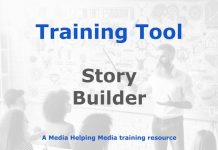
It’s essential for journalists to maintain precision in their use of language, especially when dealing with words that sound or look similar but which carry different meanings.
Journalists not only have to be accurate with their facts, they also need to be clear in their writing. Using the wrong words can confuse the audience and lead to the spread of misinformation.
Below is a list of words that are frequently misused. We hope you find it helpful. It’s likely we will add to it as new combinations come to light.
- Abuse/Misuse: Abuse is to treat badly; misuse is to use incorrectly.
- Adverse/Averse: Adverse is means harmful or unfavourable; averse means having a strong dislike or opposition to something.
- Affect/Effect: Affect is to influence; effect is a result.
- Aggravate/Annoy: Aggravate is to worsen; annoy is to irritate.
- Aid/Aide: Aid is help; aide is a person assisting.
- Aisle/Isle: Aisle is a passage; isle is an island.
- Altar/Alter: Altar is a structure where offerings are made; alter means to change or make different.
- Amend/Emend: Amend is to modify; emend is to correct text.
- Amiable/Amicable: Amiable is friendly; amicable is characterised by friendliness.
- Among/Between: Among is for more than two collectively; between is traditionally for two (although usage can vary).
- Anticipate/Expect: Anticipate is to foresee and act; expect is to believe something will happen.
- Appraise/Apprise: Appraise is to assess value; apprise is to inform.
- Assent/Agree: Assent is to concur formally; agree is to have the same opinion.
- Assumption/Presumption: Assumption is something taken for granted; presumption is an arrogant supposition.
- Assure/Ensure/Insure: Assure is to remove doubt; ensure is to make certain; insure is to protect against risk.
- Aural/Oral: Aural relates to hearing; oral relates to speaking.
- Beside/Besides: Beside means next to; besides means in addition to.
- Biannual/Biennial: Biannual occurs twice a year; biennial occurs every two years.
- Born/Borne: Born is brought into life; borne is carried.
- Borrow/Lend: Borrow is to take with intent to return; lend is to give with intent of return.
- Brake/Break: Brake is a device used to slow or stop motion; break is to separate into pieces, or a pause/interval.
- Breach/Breech: Breach is a violation; breech is the rear part of a firearm or lower rear part of the body.
- Broach/Brooch: Broach is to introduce a topic; brooch is an ornamental pin.
- Can/May: Can indicates ability; may indicates permission.
- Captivate/Capture: Captivate is to attract and hold attention; capture is to seize.
- Censor/Sensor: Censor is to suppress content; sensor is a device that detects.
- Childish/Childlike: Childish is immature; childlike is innocent.
- Chord/Cord: Chord is a musical combination; cord is a thin rope.
- Cite/Sight/Site: Cite is to quote; sight is the ability to see; site is a location.
- Collude/Conspire: Collude is to cooperate secretly; conspire is to plan secretly.
- Common/Mutual: Common is shared; mutual is reciprocal.
- Complement/Compliment: Complement completes or enhances; compliment expresses praise.
- Compose/Comprise: Compose is to create; comprise is to consist of.
- Compulsive/Compulsory: Compulsive is driven by an irresistible urge; compulsory is required by law.
- Comprise/Consist: Comprise is to include or contain; consist is to be made up of.
- Continual/Continuous: Continual occurs repeatedly; continuous occurs without interruption.
- Credible/Credulous: Credible is believable; credulous is gullible.
- Defective/Deficient: Defective has a flaw; deficient lacks something.
- Definite/Definitive: Definite is certain; definitive is conclusive.
- Dependent/Dependant: Dependent is an adjective meaning relying on; dependant is a noun meaning a person who relies on another.
- Desert/Dessert: Desert is a dry area; dessert is a sweet course.
- Diagnosis/Prognosis: Diagnosis is identification of an illness; prognosis is a prediction of its course.
- Discreet/Discrete: Discreet means tactful; discrete means separate.
- Disinterested/Uninterested: Disinterested means impartial; uninterested means not interested.
- Distinctive/Distinguished: Distinctive is characteristic; distinguished is renowned.
- Draft/Draught: Draft is a preliminary version; draught is a current of air or a drink.
- Dual/Duel: Dual means having two parts; duel is a contest between two people.
- Economic/Economical: Economic relates to the economy; economical is thrifty.
- Elicit/Illicit: Elicit means to draw out a response or fact; illicit is forbidden by law or custom.
- Emigrate/Immigrate: Emigrate is to leave one country to live in another; immigrate is to come into a country to live there.
- Emotional/Emotive: Emotional relates to emotions; emotive arouses emotions.
- Emigrate/Immigrate: Emigrate is to leave a country; immigrate is to enter a country.
- Empathy/Sympathy: Empathy is understanding feelings; sympathy is feeling pity.
- Emulate/Imitate: Emulate is to strive to equal; imitate is to copy.
- Enquire/Inquire: Enquire is for general asking; inquire is often for formal or official investigations (follow your house style if you prefer one form).
- Epidemic/Pandemic: Epidemic is a widespread disease; pandemic is a global epidemic.
- Equable/Equitable: Equable is steady or even; equitable is fair.
- Exhausted/Exhaustive: Exhausted is tired; exhaustive is thorough.
- Fair/Fare: Fair means just or light-coloured; fare is a cost or food.
- Farther/Further: Farther refers to physical distance; further refers to metaphorical distance.
- Fewer/Less: Fewer refers to countable items; less refers to uncountable items.
- Flounder/Founder: Flounder is to struggle; founder is to fail or sink.
- Flout/Flaunt: Flout is to disregard; flaunt is to show off.
- Forbear/Forebear: Forbear is to refrain; forebear is an ancestor.
- Forego/Forgo: Forego is to precede; forgo is to abstain from.
- Fortuitous/Fortunate: Fortuitous is accidental; fortunate is lucky.
- Further/Farther: Farther is usually for physical distance; further for figurative distance or additional extent.
- Grand/Grandiose: Grand is impressive; grandiose is exaggeratedly impressive.
- Hang/Hung: Hang is to suspend; hung is the past participle of hang.
- Heroin/Heroine: Heroin is an opiate; heroine is a female hero.
- Historic/Historical: Historic describes something important in history; historical simply means related to history.
- Hoard/Horde: Hoard is to accumulate; horde is a large group.
- Imaginary/Imaginative: Imaginary is unreal; imaginative is creative.
- Imply/Infer: Imply is to suggest; infer is to deduce.
- Incredible/Incredulous: Incredible means unbelievable or astonishing; incredulous means unwilling or unable to believe something.
- Incidents/Incidence: Incidents are events; incidence is the rate or frequency of something happening.
- Innovation/Invention: Innovation is a new method; invention is a new device.
- Innuendo/Insinuation: Innuendo is an indirect suggestion; insinuation is a subtle hint.
- Inflammable/Inflammatory: Inflammable is capable of catching fire; inflammatory causes inflammation or arouses anger.
- Its/It’s: Its is a possessive pronoun; it’s is a contraction of “it is.”
- Junction/Juncture: Junction is a point of intersection; juncture is a point in time.
- Knell/Knoll: Knell is a sound of a bell; knoll is a small hill.
- Lama/Llama: Lama is a Buddhist teacher; llama is a South American animal.
- Latitude/Longitude: Latitude is distance north or south; longitude is distance east or west.
- Lay/Lie: Lay is to place something; lie is to recline.
- Livid/Lurid: Livid is furiously angry; lurid is shockingly vivid.
- Loose/Lose: Loose is not tight; be unable to find something.
- Loathe/Loath/Loth: Loathe means to hate; loath/loth means unwilling.
- Luxuriant/Luxurious: Luxuriant means abundant; luxurious means opulent.
- Macho/Manly: Macho is aggressively masculine; manly is having traditionally masculine qualities.
- Majority/Most of: Majority is more than half; most of is the greater part.
- Masterful/Masterly: Masterful is domineering; masterly is very skilled.
- May/Might: May indicates possibility or permission; might indicates possibility or past possibility.
- Medical/Medicinal: Medical relates to medicine; medicinal has healing properties.
- Metal/Mettle: Metal is a substance; mettle is courage.
- Meter/Metre: Meter is a measuring device; metre is a unit of length.
- More Than/Over: More than is for quantities; over is for spatial relationships.
- Naked/Nude: Naked is without clothes; nude is unclothed for artistic purposes.
- Negligent/Negligible: Negligent is careless; negligible is insignificant.
- Niceness/Nicety: Niceness is pleasantness; nicety is a fine detail.
- Objective/Subjective: Objective is unbiased; subjective is based on personal feelings.
- Official/Officious: Official is authorised; officious is overly assertive.
- Ordinance/Ordnance: Ordinance is a law; ordnance is military weapons.
- Peddle/Pedal: Peddle is to sell; pedal is to operate a lever with the foot.
- Perpetrate/Perpetuate: Perpetrate is to commit a crime; perpetuate is to cause to continue.
- Phenomenon/Phenomenal: Phenomenon is an observable fact; phenomenal is extraordinary.
- Pitiful/Pathetic: Pitiful evokes pity; pathetic evokes contempt or pity.
- Populous/Populist: Populous is densely populated; populist appeals to ordinary people.
- Precipitate/Precipitous: Precipitate is to cause to happen suddenly; precipitous is steep or sudden.
- Prescribe/Proscribe: Prescribe is to recommend or order (often medicine or action); proscribe is to forbid by law or authority.
- Prevaricate/Procrastinate: Prevaricate is to avoid telling the truth; procrastinate is to delay.
- Principal/Principle: Principal is a head of a college; principle is a rule or fundamental truth.
- Quash/Squash: Quash is to suppress; squash is to crush.
- Reign/Rein/Rain: Reign is rule (as by a monarch); rein is control; rain is precipitation.
- Respective/Irrespective: Respective relates to each individually; irrespective means regardless.
- Restive/Restless: Restive is uneasy or impatient; restless is unable to relax.
- Shall/Will: Shall is used for future with “I” and “we” or to express obligation; will is used for future with other subjects or to express intention.
- Should/Would: Should indicates obligation or expectation; would indicates a conditional or habitual action.
- Simple/Simplistic: Simple is easy or basic; simplistic is overly simplified.
- Stationary/Stationery: Stationary means not moving; stationery is writing materials.
- Suggestible/Suggestive: Suggestible is easily influenced; suggestive implies something indirectly.
- Temerity/Timidity: Temerity is excessive boldness; timidity is lack of courage.
- That/Which: That is used for restrictive clauses; which is used for non-restrictive clauses.
- Then/Than: Then relates to time or sequence; than introduces comparisons.
- There/Their/They’re: There refers to a place; their shows possession; they’re is “they are.”
- Too/Two: Too means also or excessively; two is the number 2.
- Tortuous/Torturous: Tortuous is winding or complex; torturous involves severe pain.
- Underlie/Underlay: Underlie is to be the basis of; underlay is to place something under.
- Valuable/Invaluable: Valuable has great worth; invaluable is priceless.
- Waive/Wave: Waive is to give up a right or claim; wave is a gesture or movement or the swell of water.
- Weather/Whether: Weather refers to climate conditions; whether introduces alternatives.
- Who/Whom: Who is a subject pronoun; whom is an object pronoun.
- Who’s/Whose: Who’s is a contraction of “who is”; whose is a possessive pronoun.
- Your/You’re: Your shows possession; you’re is a contraction of “you are.”
Our list is by no means a complete list of homophones but it includes many words commonly misused in journalism. If you want to browse through almost 450 examples you might want to visit Singularis.
Sources used
- The Power of Words – John Allen (MHM)
- A Journalist’s Guide To The Use of English – Bottomley/Loftus
- Collins English Dictionary and Thesaurus
- The Guide To Better English – Gooden
- The Longman Guide To English Usage – Greenbaum/Whitcut
- The New Fowler’s Modern English Usage – Burchfield
- The Simple Subs Book – Sellers
- A Journalist’s Guide To The Use of English – Bottomley/Loftus








